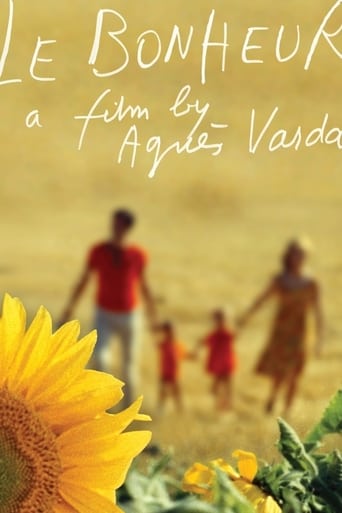

Plot so thin, it passes unnoticed.
... View MoreIn truth, there is barely enough story here to make a film.
... View MoreWhile it doesn't offer any answers, it both thrills and makes you think.
... View MoreYes, absolutely, there is fun to be had, as well as many, many things to go boom, all amid an atmospheric urban jungle.
... View MoreFrançois, a young carpenter, lives a happy, uncomplicated life with his wife Thérèse and their two small children. One day he meets Emilie, a clerk in the local post office.This film contains many feminist elements that reflect the movements that were taking place among women during that time. These feminist movements emphasized "consciousness raising" among women that encouraged the female population to refuse to be silent and "to act in their own interests," an idea that embodied the words of French feminist Simon de Beauvoir, author of The Second Sex, when she stated that "women's identity was a social construct that stood in the way of full equality." It is subversive, but cleverly so. On the surface, this is a man openly involved in an affair, and rather than deal with the consequences, everything just sort of works out okay for him. Obstacles are presented as way too easy. This is not real life. But while on the surface the message is about a man who easily has two women, the deeper message is to be found through a closer inspection.
... View MoreI watched Le Bonheur by Agnès Varda for the first film. It was about a young family man, François, who has a wife named Thérèse and two children. Seemingly, they are a completely happy family. They love each other, support each other, and for a while they seem like the perfect family. After a while, however, François starts to want a woman he met while on a business trip. He starts having an affair with her, even though she knows about his marriage. She knows it's wrong and has her doubts, but never ends the affair with him. For awhile, François is balancing his life at home with his wife and children, and his life with his mistress, Émilie. After some time passes, Thérèse notices that her husband is in better spirits than usual, and when she confronts him, he informs her of his extramarital affair. He doesn't seem to think this is reason for divorce, however, saying that there is enough of him to go around. Shortly after Thérèse finds out, she's found dead. After François has a short mourning period, he reconnects with Émilie and she soon becomes his wife and the stepmother of his children. This movie was beautiful if not unusual. It shows what goes on behind closed doors, so to speak, and how normal everyday people try to fill their lives with happiness. Even if you're in a situation that should make you happy, it's easy to poke holes in your happiness and find yourself unsatisfied with your life. This causes a search for more happiness, and sometimes the results can be disastrous.
... View MoreThis movie is rich! One of the richest out of the thousands I've seen. I had to pause it after every scene just to catch my breath and to digest the images and emotions that came from the screen. It is less like watching a movie and more like going to a painting exhibit of newly discovered Renoirs and Monets. The beauty and the music simply got my heart thumping, and then, all I can say is that the plot seems to emerge out of the art direction. Genius! It is impossible for me to free my mind now from the images, which are startlingly fresh, in the way that "Letyat zhuravli" (The Cranes are Flying) was in 1957, or the opening shot of "Cleo de 5 a 7" was in 1962. The composition of every shot is immaculately precise in the manner of Jacques Tati's "Monsieur Hulot" movies, or Godard's "Une femme mariee" (1964) or the magazine industry, but Agnes Varda's movie is greater than all of these, because whereas those are static, motionless, almost feeling-less projects, hers has somehow managed to come across fluidly, effortlessly, vividly as anything before or after until the works of Kieslowski. It felt like I was watching a scene out of some family's life in heaven, and then, one of the children looks at the camera and offers some fruit, as if Varda is winking at us and saying, "Enjoy, come in. Be a part of our wonderful time." Can life really be so wonderful as it is in this movie? The movie goes on to probe that very question. And I am better for it.
... View MoreForty years ago I saw this movie three times. Triangel love affairs are the subject of many movies, but I've never seen it more beautifully done then in this movie.I was especially impressed by the use of the music by Wolfgang Amadeus Mozart.It is the Serenade for Winds in C minor (K. 388) written in 1782. This Serenade for Winds was transcribed by Mozart to the String Quintet in C minor (K. 406). One version is used for the first relationship, the other version for the second relationship. In this way they represent 'le Bonheur' (the Happinesss) in both relationships and the whole movie.
... View More